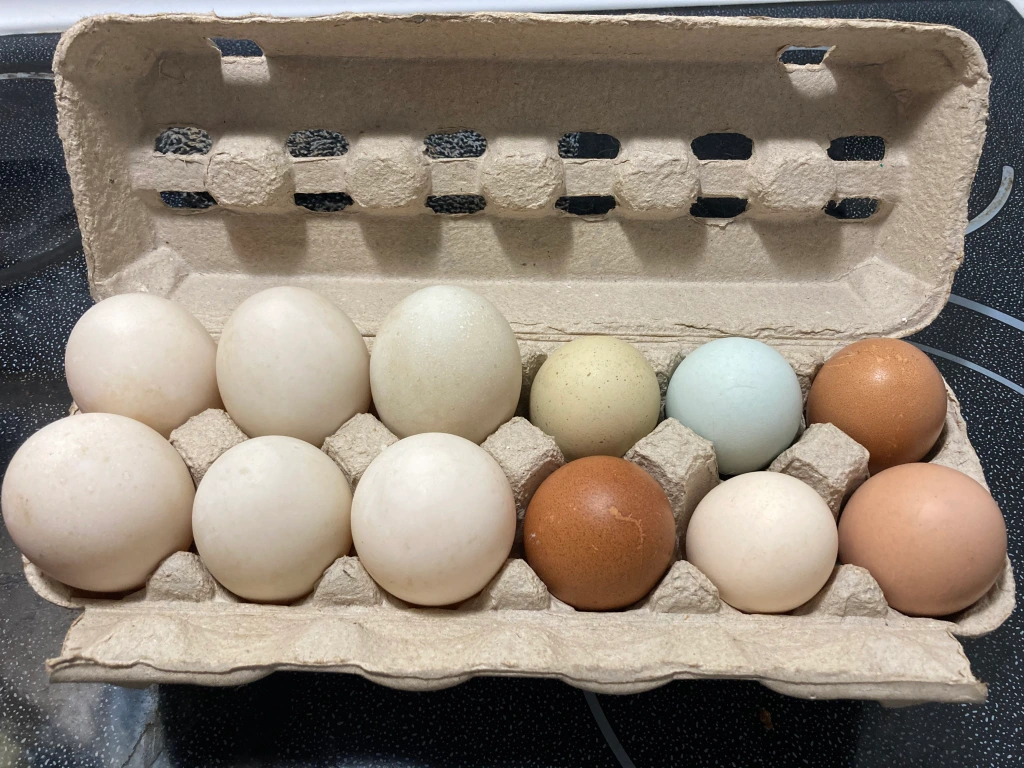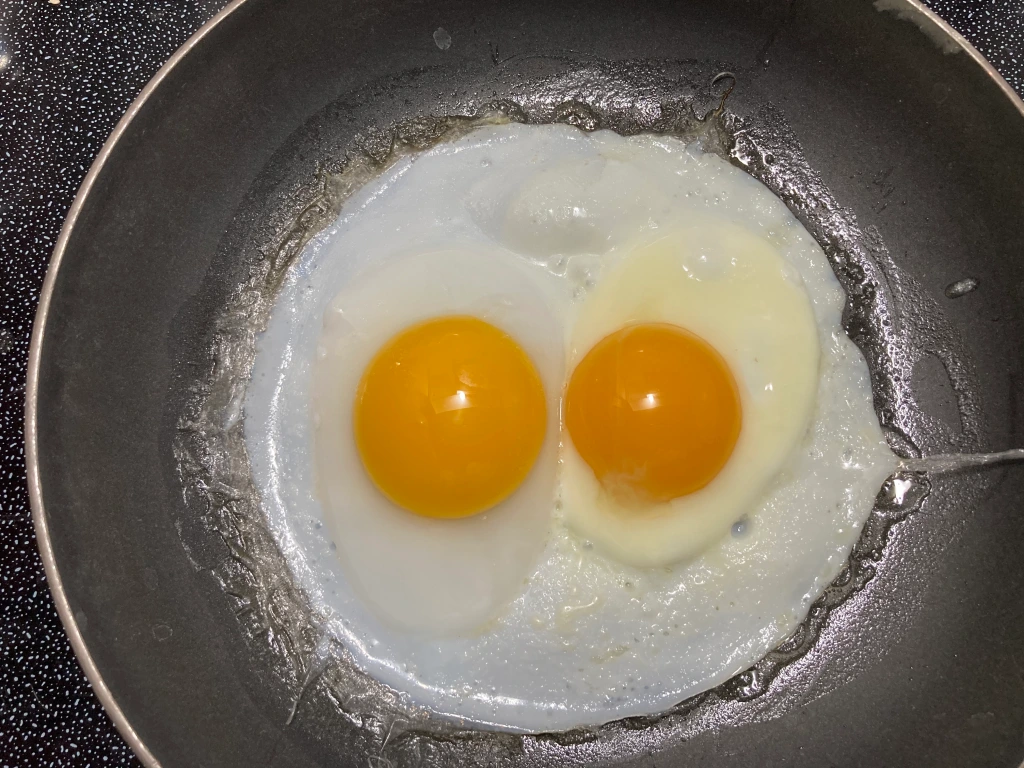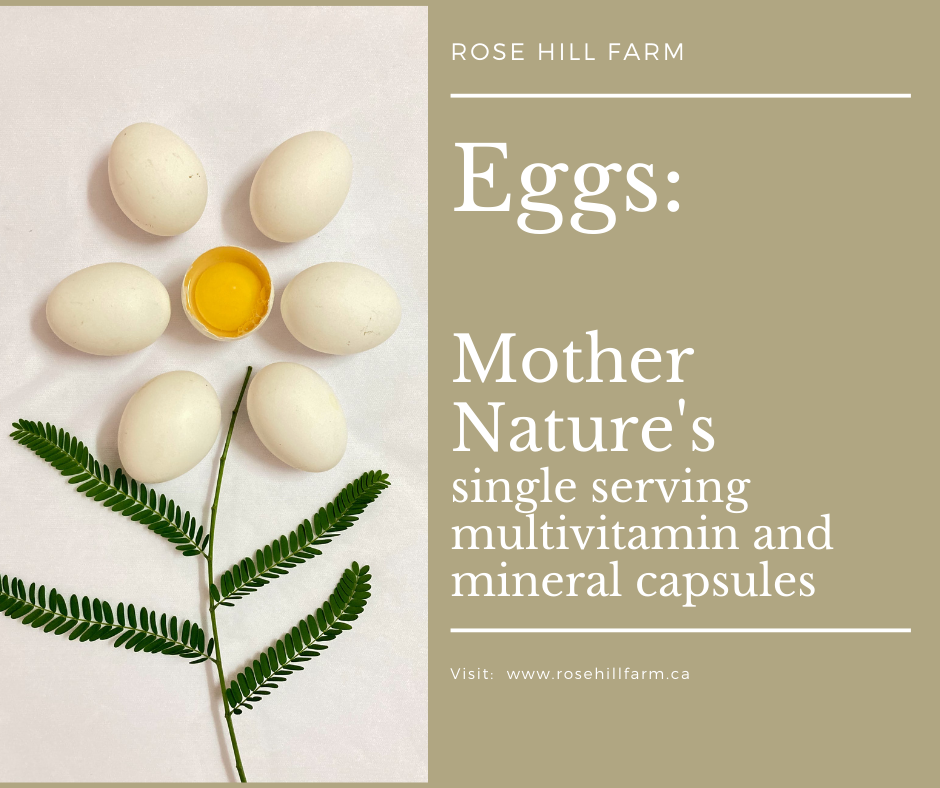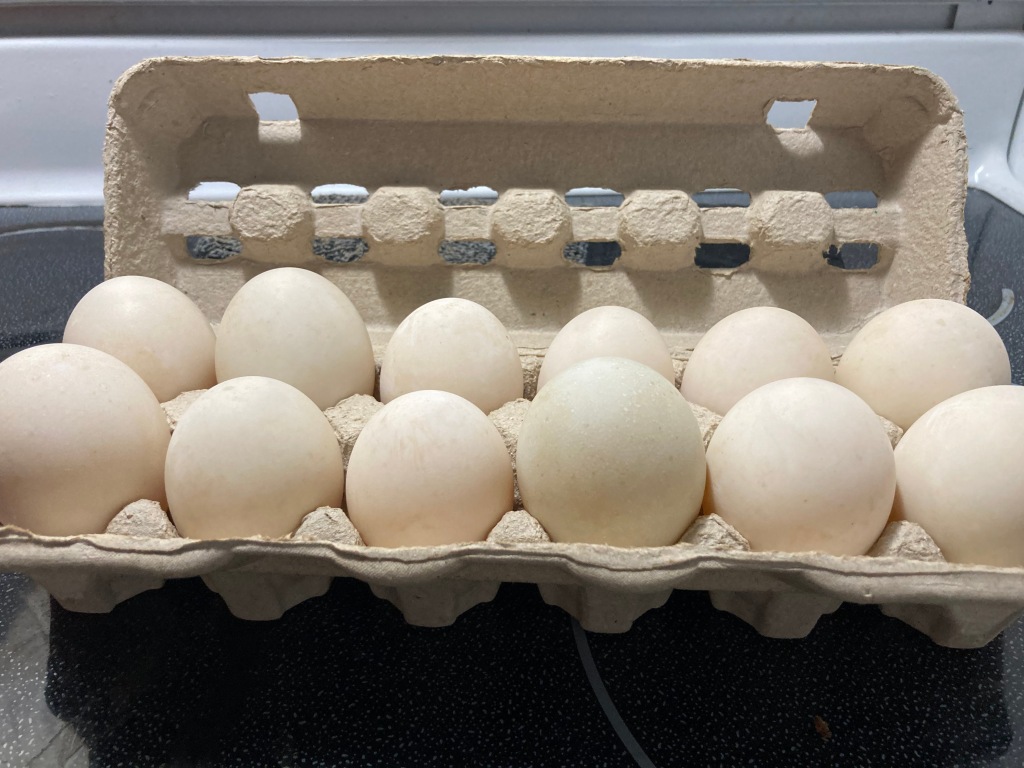If you have grown up eating chicken eggs, then you might be asking yourself what the fuss is over duck eggs. Why pay more for duck eggs? An egg is an egg right?
That’s what I thought too. At first.
Turns out the more you look into eggs, the more you realize that duck eggs have a whole lot more going for them besides being jumbo sized.
Let’s take a look at what makes duck eggs such a valuable part of the farm-to-table food scene and how they can play an important role in a healthy diet.
Would you take a look at those eggs!
Duck eggs are big! As in, if you try to pack a dozen duck eggs into a regular chicken egg carton, it is usually bursting at the seams and chances are good you can’t get the lid closed.
On average a duck egg is about 30% larger than a chicken egg, with a bigger yolk. Cracked side by side, a duck egg usually has a brighter orange-yellow yolk and whiter whites than a chicken egg. Those are big signs that there is something serious going on with these eggs (but more on that in a minute).
Duck eggs have much harder shells than chicken eggs. This makes sense given that ducks are typically bigger, heavier birds that love water and a thin-shelled egg would just crack or otherwise get waterlogged from a duck’s wet feet. That tougher shell means duck eggs store more easily, resist cracking, and stay fresh longer – three big wins in the kitchen.
If you like making tea eggs, coloring Easter eggs, or other egg crafts then duck eggs make those jobs a lot easier because of their size and hard shells.

Do duck eggs taste different?
Not only can you see the difference, but you can taste the difference in a duck egg.
All eggs are packed with the nutrients of life. They contain all 20 amino acids, a balance of fats, and essential vitamins and minerals needed for that little bird embryo (held under just the right conditions) to grow into a new life.
Humans have sought out and consumed eggs for millions of years for good reason. They taste great and they are nature’s single serving size multivitamin and mineral capsules.
Remember those darker ducky yolks and whiter whites? Most people find that duck eggs taste richer and creamier than a chicken egg and there is a lot of science that backs up those claims.
Eggs vary wildly in size, even from the same bird, but if you take 100 grams (3.5 oz) of raw duck egg and 100 g of raw chicken egg, then you can directly compare the nutritional values between them. This is what you find.
Gram for gram, duck eggs have:
x1.3 more Energy value
x1.4 more Fat,
x1.3 more Calcium
x2 more Iron,
x1.7 more Potassium
x2 more Vitamin B1 (thiamine),
x4 more Vitamin B6, and
x5 more Vitamin B12 than chicken eggs.
All that extra nutrition adds up to a different taste. Pretty impressive for an egg!
However, there is one potential downside to duck eggs. They also contain x2 more cholesterol which could be a problem for some people who are at risk of cardiovascular disease.
The table below summarizes some of the main differences between duck eggs and chicken eggs in that 100 g comparison. As guide for what 100 g of eggs actually means, the average weight of my Silver Appleyard Duck eggs (no shell) is about 70 g/egg whereas the average weight of my heritage chicken eggs (no shell) is about 50 g/egg. That means 100 g of duck eggs is a little more than one egg, whereas 100g of chicken eggs means two eggs.
| Major Components | Duck Egg (in 100 g) | Chicken Egg (in 100 g) | Duck to Chicken Ratio |
| Water | 70.8 g | 75.8 g | 0.9 |
| Energy | 485 kcal | 143 kcal | 1.3 |
| Protein | 12.8 g | 12.4 g | 1.0 |
| Carbohydrates | 1.5 g | 1.0 g | 1.5 |
| Saturated fats | 3.7 g | 3.2 g | 1.2 |
| Monounsaturated fats | 6.5 g | 3.6 g | 1.8 |
| Polyunsaturated fats | 1.2 g | 1.8 g | 0.7 |
| Cholesterol | 884 mg | 411 mg | 2.2 |
| Selected Vitamins | |||
| Vitamin A | 194 μg | 180 μg | 1.1 |
| Vitamin B1 (thiamine) | 0.16 mg | 0.08 mg | 2.0 |
| Vitamin B6 | 0.25 mg | 0.06 mg | 4.0 |
| Vitamin B12 | 5.4 μg | 1.02 μg | 5.3 |
| Vitamin D (D2+D3) | 69 IU | 98.4 IU | 0.7 |
| Folate | 80 μg | 71 μg | 1.1 |
| Choline | 263 mg | 335 mg | 0.8 |
| Selected Minerals | |||
| Calcium, Ca | 64 mg | 48 mg | 1.3 |
| Iron, Fe | 3.9 mg | 1.7 mg | 2.3 |
| Magnesium, Mg | 17 mg | 11.4 mg | 1.5 |
| Phosphorus, P | 220 mg | 184 mg | 1.2 |
| Potassium, K | 222 mg | 132 mg | 1.7 |
| Selenium, Se | 36.4 μg | 31.1 μg | 1.2 |
| Sodium, Na | 146 mg | 129 mg | 1.1 |
| Zinc, Zn | 1.41 mg | 1.24 mg | 1.1 |
All that nutrition also adds up to different characteristics when you cook with duck eggs. You can use duck eggs in any way that you can use chicken eggs in cooking. You may have to adjust your recipes to compensate for the larger duck egg size. As a general estimate, 2 duck eggs are equivalent to 3 chicken eggs in most recipes.

The real cooking bonus of duck eggs comes from baking with them! Duck eggs cause baked goods to rise more and have lighter, fluffier textures. You can instantly elevate your baking results for recipes that need to rise and lift by switching to duck eggs. Think pancakes, muffins, quiche and so on. And of course that includes anything with beaten egg whites and egg froths! Watch out Meringue Lovers – here comes duck eggs!
Are duck eggs part of a healthy diet?
People spend a LOT of money buying health supplements these days. A LOT of money. But ducks eggs offer a viable, all-natural alternative to many multivitamin and mineral supplements that are on the market. Unfortunately, there has been a lot of confusion over whether eating eggs is healthy or not.
To eat eggs or not to eat eggs? That is the question!
For years people have been told to avoid eating eggs because they were believed to increase the risk of cardiovascular disease because of their cholesterol content.
However, that confusion has changed in the last two years with the release of several studies confirming that moderate egg consumption is NOT associated with increased cardiovascular disease risk (2019, 2020-a, 2020-b). Combined, these studies looked at over 600,000 people spanning 30 years of research and each one concluded that eating one egg a day (moderate consumption) did not increase the risk of cardiovascular disease.
That means most people can enjoy eggs as a part of a healthy diet and lifestyle. That’s a big win for duck eggs as an all-natural superfood!
Many people with allergies to chicken eggs find that they can eat duck eggs with no problem. Ask your healthcare provider if duck eggs might be a viable option for you.

What are the benefits of eating eggs?
Eating eggs as part of a healthy diet benefits many parts of the body including your brain, eyes, nerves, and metabolism. Four key benefits to eating duck eggs in particular include:
- Weight loss. Eggs are nutrient dense, which means they fill you up better than many other foods. That makes eggs a great part of a weight loss program.
- Think more clearly. A single 100g serving of duck eggs contains 165% of your daily recommended dose of B12. Vitamin B12 is critical for your memory, thinking and nerve functions. Without B12 you feel weak, tired and confused.
- Increased strength and endurance. Iron deficiency is much more common than previously realized. Iron deficiency leaves your muscles feeling weak and robs you of your staying power. Many women in particular suffer from iron deficiencies. Duck eggs are a good source of easily-absorbed (bioavailable) iron with 100 g of duck eggs providing 20% of your daily recommended dose of iron.
- Sleep better. As a good source of Vitamin B6, duck eggs can contribute to a good night’s sleep. Vitamin B6 is a critical part of the pathways for the sleep hormones serotonin and melatonin. Your body cannot make Vitamin B6 on its own. Consuming duck eggs as a regular part of your diet can provide a stable B6 supply, with 100 g of duck eggs providing 15% of your daily recommended dose.
Ducky Delights!
There is one more factor to consider regarding duck eggs – ducks are delightful! They are gentle natured, sweet and funny birds that have a ravenous appetite for all manner of bugs and crawling things. That makes them a HUGE asset on any farm. I have never seen anything consume flies like a duck!
With the advent of commercialized poultry production, many types of heritage birds including ducks are disappearing. There are 6 types of ducks listed as Threatened or Critically Endangered by the Livestock Conservancy, with the Silver Appleyard Duck (now residing at Rose Hill Farm) being among them.
While most eggs being sold come from more common ducks like Pekin, Indian Runner, or Khaki Campbell, there are farmers and enthusiasts out there working to conserve the rare duck breeds. If you get a chance to buy ducks eggs that support this important conservation work, then that is a double-win.
For example, when you buy duck eggs from Rose Hill Farm, you are supporting the conservation of Silver Appleyard Ducks.
Why not get Quacking?
So the next time you are at a Farmer’s Market or see duck eggs listed for sale, why not go on a taste adventure and see what all the noise is about. Adding duck eggs to your diet can be a simple step towards better health and nutrition for you and your family. You can see, taste and feel the difference that better nutrition makes.
Fresh Silver Appleyard Duck Eggs are available for sale at Rose Hill Farm ($12/doz). Use the contact form below if you are interested in arranging for a dozen.





